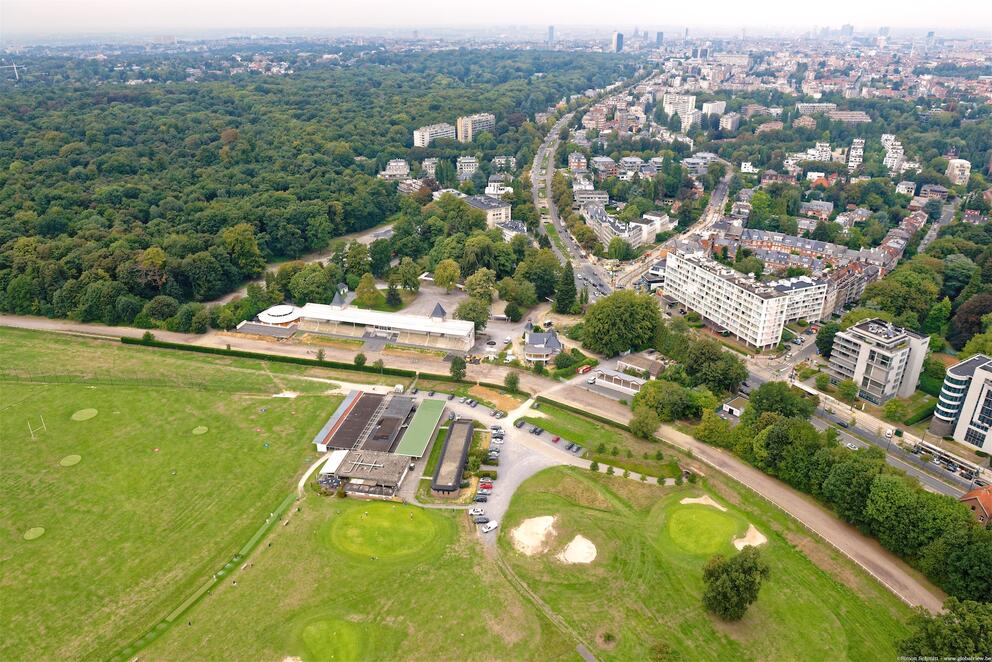Revised programming and distribution of roles for the activation of the former Uccle-Boitsfort Hippodrome
On the proposal of Minister-President Rudi Vervoort and Minister of the Environment Alain Maron, the Government of the Brussels-Capital Region has given its approval for the revision of the project for the site of the former Uccle-Boitsfort Hippodrome. The distribution of roles has also been revised: Brussels Environment is to take over the management of the green spaces and the development of nature education. The Urban Development Corporation (SAU), which is coordinating overall development, will continue its restoration of the site’s historic buildings.
This decision will make it possible to reorganise the project for the renovation, activation, management and operation of the site in line with the objectives of the Regional Sustainable Development Plan (PRDD-GPDO), the Regional Specific Land Use Plan and the Structural Vision for the Sonian Forest, in a manner consistent with urban planning regulations.
Rudi Vervoort and Alain Maron stressed that ‘This decision will enable the Hippodrome site to play its role as a gateway to the Sonian Forest and to be operated in a manner that takes account of the comments made by local residents, voluntary organisations and the municipalities. We are delighted with the overall balance of the revised project, as well as the increased role of the public institutions, in particular as guarantors of the preservation of the site’s natural environment. We also welcome the work that has been done in consultation with all the stakeholders to achieve this outcome. The general interest and public utility of the development of the former Boitsfort Hippodrome for the benefit of the people of Brussels have been decisively confirmed in recent months during the lockdown in response to the COVID-19 pandemic. Many citizens who do not have a large home or a garden have found the space they need there to get some fresh air, relax, exercise, have a walk and so on. As a space it is thus essential space during this particular period, but also vital to people’s well-being in normal times. The site will therefore be developed to meet this need for green space that is accessible to all.’
In concrete terms:
- the Region will maintain its initial objectives: to promote the site’s architectural heritage; to help preserve the biodiversity of the forest by creating a transitional area between city and forest; to offer families a green space and a place to visit combining recreational, educational and cultural aspects; and to encourage sustainable transport (walking, cycling and public transport);
- Brussels Environment is responsible for the development, management and operation of the Regional Playground, the Forest Centre, the linear park on the former race course, the forest edge, the recreational field, and education and awareness-raising activities relating to nature and the forest. In a second phase, a viewing station will be built;
- the Urban Development Corporation (SAU), the lease-holder tasked with the development of the overall site by the Region, will continue the restoration of the buildings of historical value, install water, gas and electricity supplies and redevelop the car park. With the Region’s confirmation of its desire to ensure that the site fully plays its role as the gateway to the Sonian forest, the expansion of this car park is a matter of general interest and public utility;
- the private concession-holder Drohme, which has already adapted its project several times since 2014, remains responsible for the development, management and running of the high ropes course, the golf course, the mini-golf course and the Betting Village (including the Brasserie du Pesage), as well as the management and operation of the main car park.
The new management system increases the role of the public authorities in the conversion of the former racecourse. The SAU remains the lease-holder of some 32 hectares of the site and retains responsibility for the overall coordination of its development, while its operation will now be shared almost equally between Brussels Environment (15.9 hectares) and the private concession-holder Drohme (16.4 hectares).
Gilles Delforge, director of the SAU, expressed his delight that ‘The decisions of the Regional Government, the involvement of Brussels Environment and the renegotiation of the agreement with the private concession-holder Drohme have maintained the overall direction of the project as determined by the Region and followed from the start by the SAU. At the same time, allowance has been made for the various factors that have gradually modified it in recent years. The SAU will now be able to focus on pursuing the next phase in the restoration of the site's historic buildings, the first phase of which it completed in 2016.’
Michel Culot, Chair of the Board of Directors of Drohme: ‘We believe that this reorganisation is in the interest of the general public and the park’s users. It will also enhance the leisure facilities at the gateway to this forest in the Brussels-Capital Region, which will be of benefit to large numbers of people. We are pleased that the original project can be put on a permanent footing through a balanced agreement. These combined investments and new synergies will make it possible to offer a great leisure space for all Brussels families.’

